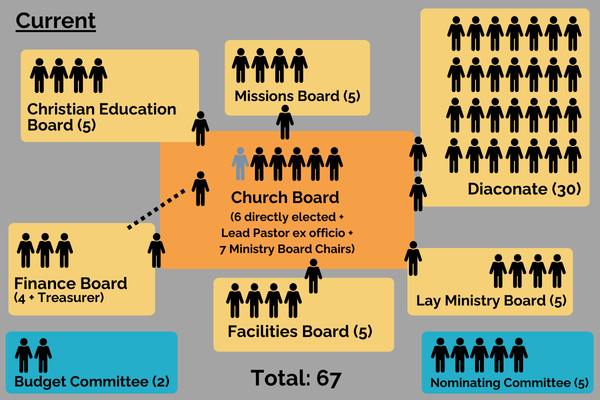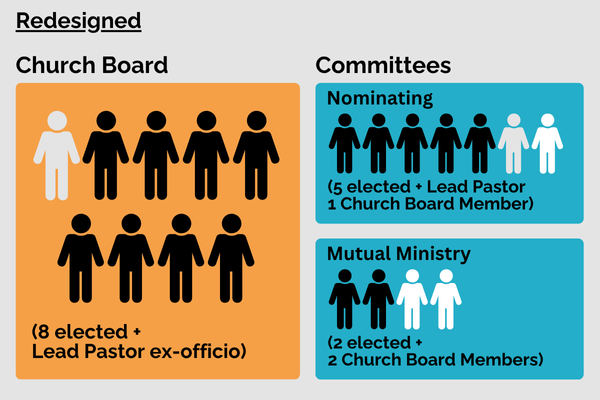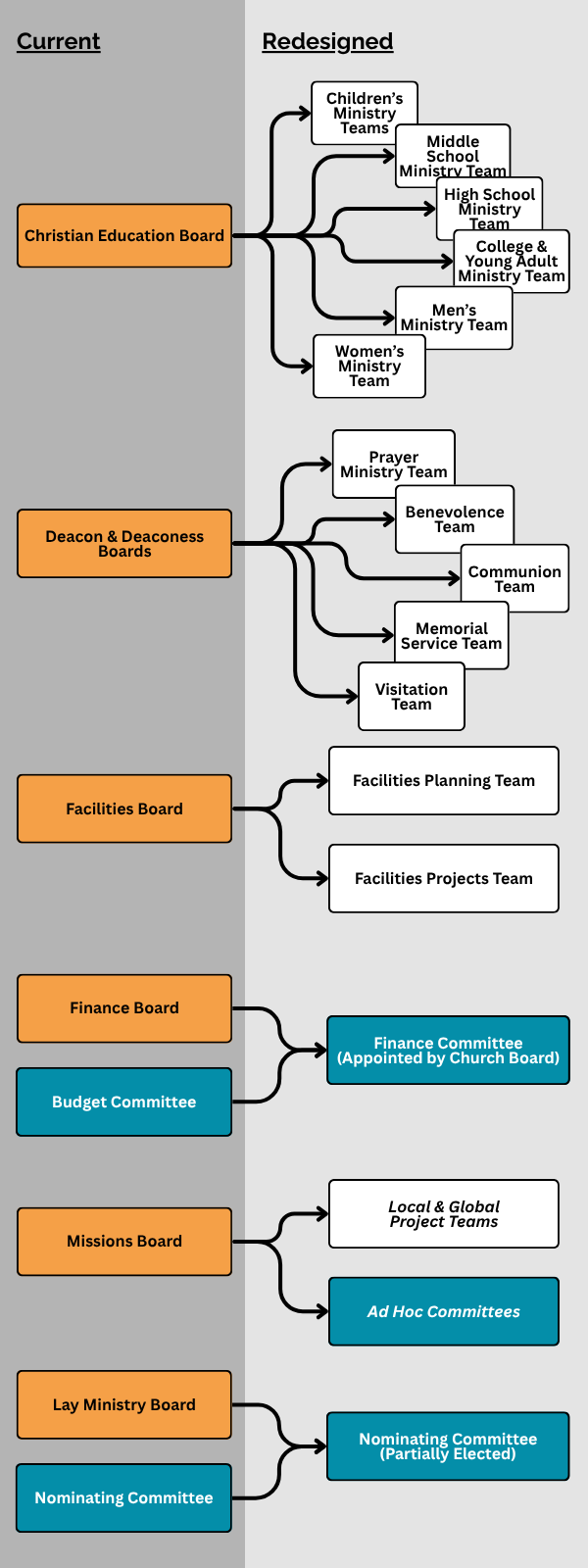How will the work of existing Ministry Boards that are not recognized as Standing Committees be done (e.g. facilities, missions, deacons)?
In no way do we envision the work of these important boards being left undone under the new structure. We expect the Church Board, staff, and congregation will work together to define various Ministry Teams or Committees as appropriate to continue the important functions of these boards, just as critical children’s, youth, senior, and worship ministries (among others) continue now without formal board oversight. While this will most likely create additional oversight functions for the Church Board members, it will provide desired flexibility to the staffing of these Ministry Teams and Committees that can be “right sized” in proportion to current, respective needs for the church.
Facilities
It was recommended that the title and purpose of the Finance Committee be re-named to the Trustee Committee, which would encompass both the financial and facility aspects representative of the 1965 Bylaws framework of a Trustee model. Management of the facilities is a year-around mission of the church to properly steward the tangible property of the church, requiring a team that is prepared to identify areas of concern as well as opportunities to leverage the campus for greater effectiveness for God’s Kingdom.
- Our campus is one of our greatest physical assets and we need to care for it. It is so important that without a doubt, we will still need people passionate about our facilities to be serving in this area. We envision that the currently elected Facilities Board would be asked to stay on as we setup a facilities team or teams.
- We suggest that two related ministry teams be established - one that is focused on planning around capital projects and improvements to our campus, and a second that consists of people who want to roll their sleeves up and do some of the project work - such as campus beautification, maintenance projects, etc.
- One of the lynch pins that holds this work together would be the forthcoming Director of Operations staff position, experienced in facilities and financial management, working closely with the facilities teams.
- From a governance perspective, the facilities teams would be a recommending body to the Church Board, and facilities team members may be called in an advisory capacity to present findings or recommendations to the Board.
Missions
Input was solicited from recent chairs and members of the Missions Board. They all expressed that the work of the Missions Board -- and especially the chair of that board -- is “enormous.” The Missions Board has a holistic function in serving a number of missionaries, both local and global, along with mission partners and outreaches. Two suggestions made were to include a standing Missions Committee in the current proposal and to create a part-time staff position to coordinate and lead our efforts with the support of Ministry Team(s).
- We agree that missions is a vital ministry, fundamental to our vision as a church. As we mentioned in our informational meetings, our governance structure specified in the bylaws (current and proposed) is in no way representative of the relative importance of various church ministries but focuses primarily on the administrative church functions.
- We recommend under the new structure that multiple local and global missions teams be established. It is also a possibility for the Church Board to establish an Ad Hoc Committee focused on missions.
Deacon Boards
There is some confusion as to the nature of the boards due to the current name. Our current Bylaws mostly focus on congregational care functions of the deacons, while in many church denominations and traditions and in the Scriptures, “deacons” hold a relatively elevated, spiritual position. Many churches equate deacons and elders. Our current and proposed bylaws structures have the Church Board as the overarching elected governing board, with the congregation having authority above the Church Board. In that sense, neither the current nor proposed bylaws have elders or deacons similar to these other models.
We recognize that some current boards manage funds, such as the deacon benevolence fund and missions support, and that there may be concern about non-elected positions overseeing these funds. There are multiple ways that such work could continue with adequate financial oversight and sensitivity, but we do not see the bylaws governance document as a necessary place to define how the work will continue. The Church Board and congregation would have the flexibility to pilot different forms of fulfilling these functions, which is a key feature of the proposed structural change.

























































